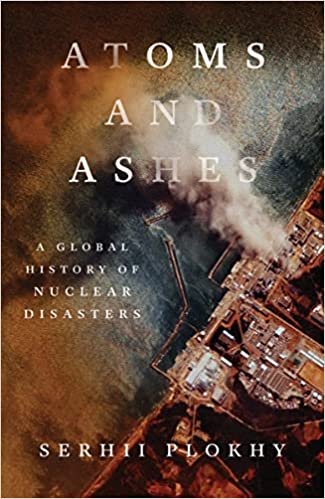Atoms and Ashes by Serhii Plokhy
/Atoms and Ashes: A Global History of Nuclear Disasters
By Serhii Plokhy
WW Norton 2022
Harvard professor Serhii Plokhy’s new book, Atoms and Ashes: A Global History of Nuclear Disasters, crafts concise narrative histories of three non-famous nuclear nightmare scenarios: the US military’s 1954 “Project Bravo” mishap on the Marshall Islands, where unpredictably excessive radiation endangered thousands of people, the 1957 Kyshtym disaster, where an explosion in a plutonium complex likewise flooded tens of thousands of miles with radiation, and Britain’s 1957 Windscale incident, where a nuclear reactor caught fire.
Plokhy, a veteran historian who’s never written a bad book, invests these tragedies with the same expertly-realized human pathos that fills all of his writing. But they’re merely preludes, and he knows it, and every reader of Atoms and Ashes will also know it. There are only three real subjects for a book about nuclear disasters: Three Mile Island in 1979, Chernobyl in 1986, and Fukushima in 2011. These were – and in the cases of Chernobyl and Fukushima, very much still are – the genuine nightmare scenarios, the times when some of the dangers of harnessing nuclear power became suddenly and appallingly clear.
As oft-chronicled as they’ve all been (including Chernobyl by this same author), Plokhy dramatizes them vividly in these pages. He captures perfectly the bureaucratic scrambling that characterized Three Mile Island. “Establishing the facts in the public relations tug of war involving Met-Ed, the [Nuclear Regulatory Commission], and the governor’s office was a difficult and often frustrating task,” he writes. “Apart from the crisis of trust, there was also a crisis of visibility. One could not see the radiation or, for that matter, take a peek inside the reactor.”
Thanks to Craig Mazin’s recent miniseries, readers of Atoms and Ashes will feel as if they have, in fact, peeked inside the blighted reactor at Chernobyl, and many of the names – and the infamous countdown-timeline – will be familiar to those readers. Plokhy shades in those outlines with well-chosen horrifying details, as when he notes that although Soviet leader Gorbachev was very active marshaling resources behind the scene, he insisted on normal outward appearances as long as possible, even going so far as ordering the May Day parade in Kyiv to proceed as scheduled, despite the reactor burning out of control 90 kilometers away. “Among those who marched that day were not only adults but also children who had practiced for the event for days. Now they could finally show the cheering crowds how good they were at marching and dancing,” he writes, mordantly adding: “Later, the KGB saw to it that the uniforms the children wore to practice for the parade and march on May Day were sent for decontamination.”
And although Chernobyl is very much still a radiation threat, the immediacy here is reserved for Fukushima, whose damage and ongoing peril will likely last a generation even under the most conscientious care. And just how conscientious will that care be, as the drive to build more nuclear power plants increases all over the world? Advocates of nuclear power cry it up as the only climate-conscious response to increasing climate instability. These advocates largely dismiss the problem of nuclear waste disposal – Plokhy briefly mentions that it’s a problem just blithely being left to posterity – but reading Atoms and Ashes makes a larger conclusion all but inevitable: the risk of nuclear power far outweighs the reward.
Such a conclusion is probably natural after reading the last page of a book about disasters, but even balancing Plokhy’s accounts by remembering all the houses, schools, and hospitals powered by nuclear reactors doesn’t help much. Chernobyl displaced hundreds of thousands of people, and we may never know the full tally of Fukushima. Contemplating another such nightmare will have even Plokhy’s most conservative readers thinking about going solar.
-Steve Donoghue is a founding editor of Open Letters Monthly. His book criticism has appeared in The Washington Post, The American Conservative, The Spectator, The Wall Street Journal, The National, and the Daily Star. He writes regularly for The Boston Globe, the Vineyard Gazette, and the Christian Science Monitor. He’s a books columnist for the Bedford Times Press and the Books editor of Big Canoe News in Georgia, and his website is http://www.stevedonoghue.com.
